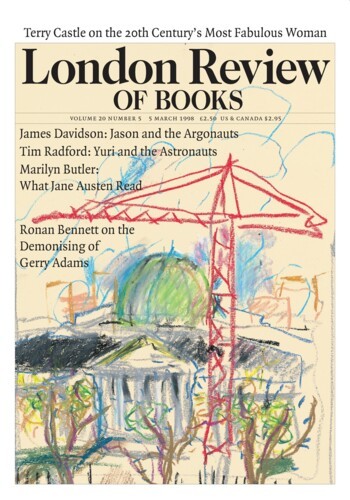Out of the Pound Loney: the demonising of Gerry Adams
Ronan Bennett, 5 March 1998
Shortly after the 1994 IRA ceasefire, the New Statesman ran a cartoon depicting Gerry Adams as a reptilian protohuman emerging from a primordial sea to take his first trepid step on the long evolutionary walk from terrorist godfather to constitutional politician. To judge from this biography, the Sinn Féin leader still has some way to go. According to David Sharrock and Mark Devenport, Adams is a ruthless, scheming hypocrite who talks peace in front of the cameras, but in private continues to plot death and misery. He speaks of ‘inclusion’ and publicly condemns sectarianism, but has boasted that he would ‘wade up to my knees in Protestant blood’ to achieve a united Ireland. He is a physical and moral coward, ‘aloof’, a poseur, who for all his ‘studied image as a man of letters and an intellectual’, has a second-rate brain. He is treacherous – the authors hint that he even set a rival up for assassination. Sources quoted in Man of War, Man of Peace? describe Adams as ‘akin to a Nazi’, a racketeering criminal thug’, ‘a fundamentalist’. No misdemeanour is overlooked: he was an indifferent student, enjoys the occasional lie-in with his wife and may have dyed his beard.’‘


